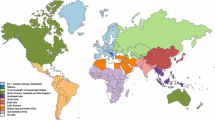Abstract
We compared the self-reported subjective wellbeing of Māori and New Zealand (NZ) Europeans in two NZ national postal samples. The first sample was collected in 2005 before the global financial crisis of 2007/2010. The second was collected in 2009 while the crisis was ongoing. Both samples contained large and arguably representative samples of the indigenous peoples of NZ, Māori (Ns = 289 and 964) as well as the now-majority group, NZ Europeans (Ns = 2,769 and 4,073). NZ Europeans’ scores on the Personal Wellbeing Index (PWI) were near-identical across the 2005 and 2009 samples. However, Māori, who were already lower than NZ Europeans on the PWI in 2005, showed a further decrease in 2009. We argue that this gap in wellbeing widened because material advantages experienced by NZ Europeans as a social group provides a systemic buffer which protects their personal wellbeing from the impact of economic privation. Māori, who had already experienced systemic disadvantage, were not privileged with this buffer, and thus, the effects of the 2007/2010 global financial crisis impacted their personal wellbeing to a greater extent.


Similar content being viewed by others
Notes
Note that we reported data on unemployment rates for all ethnic groups for which data were available, although we focus specifically on the subjective wellbeing gap between Māori and NZ Europeans, given that we had access to data for only these two ethnic groups across the same period.
References
Brockmann, H., Delhey, J., Welzel, C., & Yuan, H. (2009). The China puzzle: Falling happiness in rising economy. Journal of Happiness Studies, 10, 387–405.
Brosnan, S. F., & de Waal, F. B. M. (2003). Monkeys reject unequal pay. Nature, 425, 297–299.
Cohen, B. H. (2002). Calculating a factorial ANOVA from means and standard deviations. Understanding Statistics, 1, 191–203.
Cummins, R. A., Eckersley, R., Pallant, J., van Vugt, J., & Misajon, R. (2003). Development of a national index of subjective wellbeing: The Australian Unity Wellbeing Index. Social Indicators Research, 64, 159–190.
Diener, K., & Seligman, M. E. P. (2004). Beyond money: Toward an economy of well-being. Psychological Science in the Public Interest, 5, 1–31.
Duncan, G. (2010). Should happiness-maximisation be the goal of government? Journal of Happiness Studies, 11, 163–178.
Ganglmair-Wooliscroft, A., & Lawson, R. (2008). Applying the international wellbeing index to investigate subjective wellbeing of New Zealanders with European and with Maori heritage. Kotuitui: New Zealand Journal of Social Sciences Online, 3, 57–72.
Graham, C., & Pettinato, S. (2002). Frustrated achievers, winners, losers, and subjective well-being in new market economies. The Journal of Development Studies, 38, 100–140.
Hagerty, M. R., & Veenhoven, R. (2003). Wealth and happiness revisited—growing national income does go with greater happiness. Social Indicators Research, 64, 1–27.
Houkamau, C. A., & Sibley, C. G. (2010a). Māori cultural efficacy and subjective wellbeing: A psychological model and research agenda. Social Indicators Research. doi:10.1007/s11205-010-9705-5.
Houkamau, C. A., & Sibley, C. G. (2010b). The multi-dimensional model of Māori identity and cultural engagement. New Zealand Journal of Psychology, 39, 8–28.
Howell, R. T., & Howell, C. J. (2008). The relation of economic status to subjective well-being in developing countries: A meta-analysis. Psychological Bulletin, 134, 536–560.
Howell, C. J., Howell, R. T., & Schwabe, K. A. (2006). Does wealth enhance life satisfaction for people who are materially deprived? Exploring the association among the Orang Asli of Peninsular Malaysia. Social Indicators Research, 76, 499–524.
International Wellbeing Group. (2006). Personal Wellbeing Index (4th Ed.). Melbourne: Australian Centre on Quality of Life, Deakin University. http://www.deakin.edu.au/research/acqol/instruments/wellbeing_index.htm.
Minkov, M. (2009). Predictors of differences in subjective well-being across 97 nations. Cross-Cultural Research, 43, 152–179.
New Zealand Equal Employment Opportunities Trust. (2009). People management in tough economic times: Employer’s responses to the recession. Wellington: NZEEO Trust.
New Zealand Ministry of Social Development. (2008). The social report. New Zealand: Ministry of Social Development.
New Zealand Ministry of Social Development. (2009). The social report. New Zealand: Ministry of Social Development.
New Zealand Treasury. (2010). Monthly economic indicators: May 2010. Report Prepared by The New Zealand Treasury.
Sibley, C. G. (2009). The New Zealand attitudes and values study 2009: Sampling strategy and questionnaire items. Unpublished technical report, The University of Auckland.
Silla, I., De Cuyper, N., Gracia, F. J., Peiró, J. M., & De Witte, H. (2009). Job insecurity and well-being: Moderation by employability. Journal of Happiness Studies, 10, 739–751.
Smith, D. M., Langa, K. M., Kabeto, M. U., & Ubel, P. A. (2005). Health, wealth and happiness: Financial resources buffer subjective well-being after the onset of a disability. Psychological Science, 16, 663–666.
Statistics New Zealand. (2009). New Zealand income survey: June 2009 quarter. Report prepared by Statistics New Zealand. Statistics New Zealand.
Tiliouine, H., Cummins, R. A., & Davern, M. (2006). Measuring wellbeing in developing countries: The case of Algeria. Social Indicators Research, 75, 1–30.
Veenhoven, R. (2004). Happiness as a public policy aim: The greatest happiness principle. In P. A. Linley & S. Joseph (Eds.), Positive psychology in practice (pp. 658–678). Hoboken: Wiley.
Veenhoven, R., & Kalmijn, W. (2005). Inequality-adjusted happiness in nations: Egalitarianism and Unitarianism married together in a new index of societal performance. Journal of Happiness Studies, 6, 421–455.
White, P., Gunston, J., Salmond, G., Atkinson, J., & Crampton, P. (2008). Atlas of socio-economic deprivation in New Zealand. Public Health Intelligence Occasional Bulletin (Vol. 50). Wellington: Ministry of Health.
Acknowledgments
Collection of the New Zealand Attitudes and Values Study 2009 (NZAVS-09) data analyzed in this paper was funded by a University of Auckland FRDF (#3624435/9853) grant awarded to Chris Sibley.
Author information
Authors and Affiliations
Corresponding author
Rights and permissions
About this article
Cite this article
Sibley, C.G., Harré, N., Hoverd, W.J. et al. The Gap in the Subjective Wellbeing of Māori and New Zealand Europeans Widened Between 2005 and 2009. Soc Indic Res 104, 103–115 (2011). https://doi.org/10.1007/s11205-010-9729-x
Accepted:
Published:
Issue Date:
DOI: https://doi.org/10.1007/s11205-010-9729-x




